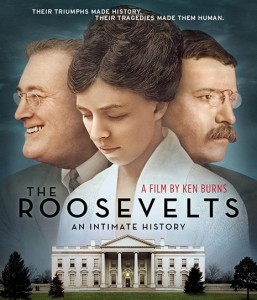Just as “The Civil War” and “The War” before it, master documentarian Ken Burns’ “The Roosevelts: An Intimate History” is turning out to be a massive blockbuster for PBS.
The sprawling documentary chronicling the lives of Theodore, Franklin Delano and Eleanor Roosevelt began Sunday night with the first of its seven, two-hour episodes, which garnered a 5.8 rating and an average audience of 9.06 million viewers, according to Nielsen Fast National data, Live + SD.
Before the first chapter aired, more than 200,000 views of trailers for “The Roosevelts” foretold the strong demand for the series.
Burns, whose other recent documentaries include “Prohibition” (2011) and “The Dust Bowl” (2012), said that releasing a film is like having a conversation with your closest friends and family. If, of course, they number in the millions of people.
“I’m always struck by the thoughts and comments and how engaged the American people are,” he said. “The fact that such a large audience tuned in the first night is all the more rewarding. We hope more people have a chance to watch on all of the platforms PBS has set up to share the work.”
In addition to the broadcasts which run through September 20, the 14-hour series is streaming at pbs.org/theroosevelts, PBS stations’ digital platforms, Roku and Apple TV– and will be available through September 29.
“The Roosevelts,” written by Geoffrey C. Ward and narrated by Peter Coyote, spans more than 100 years, from Theodore’s birth in 1858 to Eleanor’s death in 1962, vividly bringing to life the history of two presidencies, multiple family tragedies, Prohibition, the Depression and two world wars.
With never-before seen photographs and vibrant but silent film, the first chapters chronicle the life of Teddy Roosevelt, born into a world of privilege, who became America’s 26th president in a term that began 113 years ago almost to the day, on Sept. 14, 1901, after President William McKinley was assassinated.
He was, at age 42, the youngest person to become president. Overcoming severe asthma as a youth, the ambitious Roosevelt had already made a name for himself as a New York City police commissioner, an assistant secretary of the Navy, governor of New York and vice president.
His cowboy persona, epitomized by forming the Rough Riders during the Spanish-American War, and his large ego were legendary. His most famous slogan, “Speak softly and carry a big stick,” resonates to this day. Other catchphrases, indicative of his boundless energy, were “Bully!” and “Dee-lighted.”
Roosevelt ate a dozen eggs for breakfast every morning, drank coffee from a massive mug and dictated 150,000 letters in his lifetime, which the Theodore Roosevelt Center in Dickinson, ND is trying to get all online.
But as Burns does so well, and with Roosevelt brought to life in his own words by the voice of Paul Giamatti, viewers get a detailed, insightful, 360-degree version of Theodore—including his battles with depression, his tragic loss of both his first wife and his mother on the same day and an assassination attempt—which contribute to a greater understanding of one of the most prominent leaders in U.S. history.
As the docu-series moves on to the era of Franklin and Eleanor, Theodore’s distant cousin and his niece, viewers will hear them come to life, voiced by actors Edward Herrmann (who played FDR in the landmark 1976 miniseries “Eleanor and Franklin”) and Meryl Streep.
The stories of the more modern-era Roosevelts, well-chronicled as they have been for decades, are even more captivating on Burns’ canvas, with images and video so clear they feel almost contemporary.
(“The Roosevelts: An Intimate History” airs on PBS stations at 8 p.m. PT/ET, 7 p.m. C through September 20.)
–Hillary Atkin


